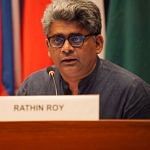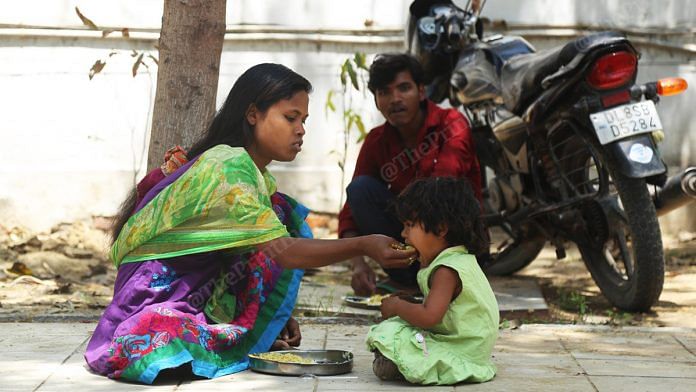 Break the food lockdown
Break the food lockdown
Jean Dreze | Visiting professor at the Department of Economics, Ranchi University
The Indian Express
Dreze argues that to provide relief to the poor during the nationwide lockdown, excess stocks of the Food Corporation of India must be released to states. He notes that food reserves are better than cash transfers since “in the poorer states, the density of rural banks is very low. Business correspondents (extension counters of the banks) are not safe at this time because they use fingerprint authentication. If their work is suspended, rural banks are likely to be massively overcrowded.” He notes, “Food transfers are bound to play a big role in keeping poor people alive in the next few months”.
 Command to confidence
Command to confidence
Pratap Bhanu Mehta | Contributing editor, The Indian Express
The Indian Express
Mehta argues that while imposing a lockdown requires command, removing the lockdown requires the ability to instill confidence in people. “It is the quality of governance that will mediate the path to opening up, not just the economics versus life debate. The government will have to inspire total confidence in the robustness of the information it is putting out, whether on testing or supplies,” he writes.
 A global pandemic and globalisation
A global pandemic and globalisation
Dhruva Jaishankar | Director of US Initiative at the Observer Research Foundation
Hindustan Times
Jaishankar focuses on the impact of the Covid-19 pandemic on globalisation and writes, “There will almost certainly be calls for the re-nationalisation of manufacturing, particularly for what are considered critical or essential goods. The recent bickering over personal protective equipment (PPE) and pharmaceuticals have brought this to the fore. This will further complicate trade agreements, both those in force and those under negotiation.” He explains that globalisation of people will also face a certain amount of restriction.
 Politics and pandemics in the age of social media
Politics and pandemics in the age of social media
Arghya Sengupta | Research director, Vidhi Centre for Legal Policy
Hindustan Times
Referring to US President Donald Trump and Prime Minister Narendra Modi, Sengupta explains how leaders playing to their strengths in their messaging as they confront a pandemic and are using social media as a tool.
Modi, for instance, talks about sacrifice and reinforcing India’s global image.
“Both Modi and Trump have correctly understood that in the information age, assuaging citizens matters more than taking nuanced decisions. With people receiving all kinds of mixed messages from wearing N95 masks to not wearing masks at all, and everything else in the middle, it is important to be clear, simple and authoritative. The moment does not lend itself to nuance.”
 Needed, greater decentralisation of power
Needed, greater decentralisation of power
Suhrith Parthasarathy | Advocate practising at the Madras High Court
The Hindu
Pathasarathy argues that federal limitations are becoming hurdles as states take up positions of leadership to respond to the Covid-19 crisis.
He mentions three federal limitations — “The inability of States to access funds and thereby structure their own welfare packages. Two, the curbs imposed by a public finance management system that is mired in officialdom. This has prevented States from easily and swiftly making payments for the purchase of health-care apparatus such as ventilators and personal protective equipment. Three, the colossal disruption of supply chains not only of essential goods and services but also of other systems of production and distribution, which has placed States in a position of grave economic uncertainty.”
 Establish fiscal council to scale up spending
Establish fiscal council to scale up spending
Rathin Roy | Director, National Institute of Public Finance and Policy
Business Standard
Roy comments on the fiscal spending of the government to deal with the coronavirus crisis. “While the consensus is for relaxing the hard fiscal constraints, (there is) some worry that we do not have the luxury to do what developed countries have done”, explains Roy. He argues that “India will have to address the big fiscal prudence challenge, which is not captured by the fiscal deficit/GDP metric” and “government spending repeatedly does not reach its targets; unspent balances are a reflection of this”. He warns that “Public spending must be carefully monitored to ensure that it is demonstrably reaching the intended beneficiaries, otherwise there will be serious macroeconomic consequences— including inflation hotspots— even before monetisation is contemplated.”
 Time to reform takeover pricing
Time to reform takeover pricing
Somasekhar Sundaresan | Advocate and an independent counsel
Business Standard
Sundaresan writes on the regulatory reforms that India can do during the Covid-19 crisis to ease the situation. He argues that “this is a good time to think about getting some structural reforms underway”. He says “Covid-19 may affect human beings but the measures taken in the wake of Covid-19 would indeed affect the economy adversely”. He explains that “most regulatory provisions written into law are bull market regulations – the assumption in writing them is always that the market price of securities would go up” but now “the regulator has to wear a new thinking cap and think through how to deal with quickly re-orienting itself to write regulations for a bear market”.
 We simply don’t know when this tsunami of suffering will recede
We simply don’t know when this tsunami of suffering will recede
Anurag Behar | CEO of Azim Premji Foundation
Mint
Behar comments on the consequences of Covid-19 on those suffering from diseases other than the virus. “On healthcare, one part is medical care for the usual diseases.” and “Clinics and small hospitals are shut, so people with ‘normal’ ailments are finding treatment elusive”, explains Behar. He argues that “Most avoid hospitals, but when forced by the severity of their condition, they don’t find one to treat them”. He warns that we don’t know when this crisis will end, but by then its impact on other areas “that will be left behind cannot be put back together soon, and we do not exactly know how”
 When an individual habit has a bearing on collective well-being
When an individual habit has a bearing on collective well-being
Biju Dominic | CEO of Final Mile Consulting, a behaviour architecture firm
Mint
Dominic comments on society’s behaviour during the coronavirus pandemic. “The corona pandemic has demonstrated that even in life-and-death situations, humans are unwilling to adopt new behaviours”, says Dominic. “Despite awareness being spread, the police are being compelled to use coercive tactics to get people to stay at home”, “many are not maintaining physical distance in public places”, and “neither are they wearing masks when they step outside their homes”, explains Dominic. Dominic says that one of the measures recommended to prevent coronavirus is hand washing and the sales of hand sanitisers have increased manifold. He points out that “for decades, health authorities around the world have been trying hard to make people wash their hands with soap often, but could not achieve satisfactory outcomes” and “The Covid-19 pandemic could be an opportunity to make the washing of hands a new social norm of the modern world”.
Today’s Editorials
Hindustan Times: The newspaper notes that the plight of people with disabilities has almost gone unnoticed during the nationwide lockdown. It says that quarantining, social distancing and work from home is almost impossible for them due to their everyday dependence on caregivers. It suggests that the government should ensure doorstep delivery of supplies, make areas more accessible and give them the support they need.
The Times of India: The city of Wuhan where the coronavirus first emerged ended its lockdown Thursday after 76 days. It shows that there is hope for other countries trying to control the pandemic through their own containment measures, the daily comments. Also in Italy and China, cases of new infections have been dropping. It indicates that there is light at the end of the tunnel, TOI writes.
The Hindu: The daily welcomes the government’s move to suspend the MPLAD (Member of Parliament Local Area Development Scheme) to make funding available for Covid-19. Past experiences also indicate that some members do not utilise their full entitlement. The CAG has flagged instances of financial mismanagement and inflation of amounts spent. Therefore the current suspension gives some scope for a reconsideration in the scheme in its totality, Hindu writes.
The Indian Express: The daily writes on Congress leader Sonia Gandhi’s request to the PM to ban advertisements in the media for two years. It shows a completely shocking misunderstanding of news as a public good, writes Express. The revenue model for good journalism has always been unsteady and banning the advertisement is a “time-tested way to harass press”, it notes. The Congress should think of ideas that actually work regarding battling Covid-19, it concludes.
With inputs from Unnati Sharma



